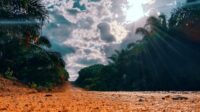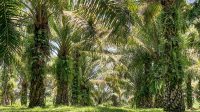PALMOILMAGAZINE, JAKARTA – PT Perkebunan Nusantara (PTPN) IV PalmCo has reaffirmed its commitment to supporting Indonesia’s smallholder palm oil replanting program (PSR). For 2025, the company has set an ambitious target of 22,000 hectares of partner farmers’ plantations to join the program—double the 11,000 hectares achieved in the first half of the year.
“Our target by December is 22,000 hectares. By 2029, PalmCo aims to facilitate replanting across 86,000 hectares of smallholder plantations,” said PTPN IV PalmCo President Director Jatmiko Santosa in an official statement.
Jatmiko emphasized that strengthening the PSR program is vital for boosting the competitiveness of Indonesia’s palm oil industry. At present, smallholder yields remain low, averaging just 2–3 tons of CPO per hectare annually, while replanting with high-yield seeds could significantly improve productivity.
Also Read: PTPN IV PalmCo Boosts Fire Mitigation Efforts with Firefighting Teams and Advanced Monitoring Tech
He highlighted three key enablers for accelerating PSR: relaxing program requirements, resolving land status issues, and ensuring the supply of quality seeds. “These three factors are essential for scaling up replanting efforts,” he added.
Although palm oil remains the world’s leading vegetable oil in both production and consumption, Jatmiko pointed to stagnant global productivity and shifting market dynamics. “CPO used to be cheaper than rapeseed oil, but now it’s more expensive. We often boast about CPO being the most productive and competitive, but if we get complacent, we could fall behind,” he cautioned.
Seed Quality Matters
Beyond replanting, seed quality is critical. With smallholders managing the majority of Indonesia’s palm oil plantations, access to high-quality seeds is essential. Certified seed production from 20 official suppliers currently stands at 4.1 million seedlings, with 241 million germinated seeds produced—well above the estimated national demand of 151 million for 2025.
Still, Jatmiko stressed that quantity is not enough. “What we need is not just more seeds, but better seeds with proven high yields,” he said.
Rising Demand for CPO in Energy and Food
Boosting productivity is also crucial as Indonesia expands its biofuel policies. By 2027, the government plans to implement B50, blending 50% of biodiesel with palm oil-based feedstock.
With the current B35 mandate, biodiesel demand already reaches 13.15 million kiloliters. Switching to B50 could require an additional 6.7 million kiloliters, equivalent to 7.2 million tons of CPO.
“We must ensure this extra demand does not compromise food supply. That’s why increasing national CPO output is not an option—it’s a necessity,” Jatmiko asserted.
Commitment to ESG Principles
Amid global challenges, PalmCo remains firm in its commitment to environmental, social, and governance (ESG) principles as the cornerstone of sustainable palm oil development.
“Implementing ESG standards is the best way to address sustainability concerns that continue to surround our industry,” Jatmiko concluded. (P3)





































